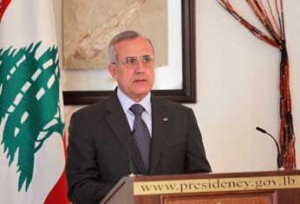 During a speech addressing Arab and foreign diplomats at the Presidential Palace in Baabda, Lebanese President Michel Suleiman urged rival Lebanese politicians Monday to cooperate in order to resolve the country’s deepening political crisis.
During a speech addressing Arab and foreign diplomats at the Presidential Palace in Baabda, Lebanese President Michel Suleiman urged rival Lebanese politicians Monday to cooperate in order to resolve the country’s deepening political crisis.
Suleiman stressed that there is still a chance for a settlement despite the current tensions over the U.N.-backed Special Tribunal for Lebanon (STL) , probing the 2005 killing of former Lebanese Prime Minister Rafik Hariri.
Suleiman also stressed that despite his appreciation for the mediation by the Arab leaders , the primary responsibility to solve the political crisis rests on the the shoulders of the Lebanese.
“Despite our appreciation for Arab leaders on their initiative… the primary responsibility to find the appropriate political solution rests on our shoulders as Lebanese … to bring about the appropriate political solutions through institutions and honest and creative dialogue” Suleiman told the diplomats.
“We still have the opportunity despite the current polarization to prove our ability to manage our own affairs by ourselves and take bold and wise choices that would lead us again to the paths of stability, justice, growth and economic and social development,” he added
His speech came hours after he decided to postpone for one week the parliamentary consultations for nominating a new prime minister to lead the new cabinet.
The two-day consultations were scheduled to begin Monday
Suleiman angers March 14
Suleiman’s decision to postpone parliamentary deliberations angered the March 14 majority coalition.
Earlier on Monday it was reported that caretaker Prime Minister Saad Hariri was against postponing parliamentary consultations .
Future TV quoted on Monday an unnamed source as saying that postponing the parliamentary consultations to nominate a new premier served the interest of Hezbollah-led March 8 coalition.
The postponement was reportedly requested by the March 8 coalition.
The Phalange party, a key member of March 14 alliance labeled the postponement as “inappropriate because it is difficult to tamper with constitutional events.”
Lebanese Forces leader Samir Geagea, another key member of March 14 alliance expressed his regret over the delay in consultations and “going back on official dates under pressure, threats, and external interference aimed at pushing caretaker Prime Minister Hariri to accept in advance what he previously rejected.”
“The reasons for delaying the deliberations are very clear and easy. After it became clear that … Hariri will be re-nominated, extensive pressures were exerted from inside and outside to prevent the nomination of Hariri. They are disrupting the democratic game to achieve their goals,” Geagea said after chairing a meeting for the L.F. parliamentary bloc at his residence in Maarab.
Ya Libnan correspondent reported that the opposition is still trying to pressure MP Walid Jumblatt who has the decisive vote to switch allegiance.
Parliamentary arithmetic
Hariri’s “March 14″ coalition won a majority in the 128-seat assembly in a 2009 election, but Jumblatt who was a central figure in the Cedar Revolution has since defected.
Current parliament makeup
March 14 – 71 members
March 8 – 57 members
If Jumblatt switches his 11 members to March 8 then March 14 will end up with 60 members and March 8 will end up with 68 members
But according to local reports Jumblatt was unable to convince the members of his bloc to switch despite the pressure by Hezbollah and Syria
At best Jumblatt can switch himself and 5 other members, according to local observers…. in this case:
March 14 will end up with 65 members ( 71-6)
March 8 will end up with 63 members ( 57 +6)
In such a scenario Hariri will be renominated to lead the new cabinet
According to local reports March 8 parties would nominate former Prime Minister Omar Karami.

Leave a Reply
You must be logged in to post a comment.